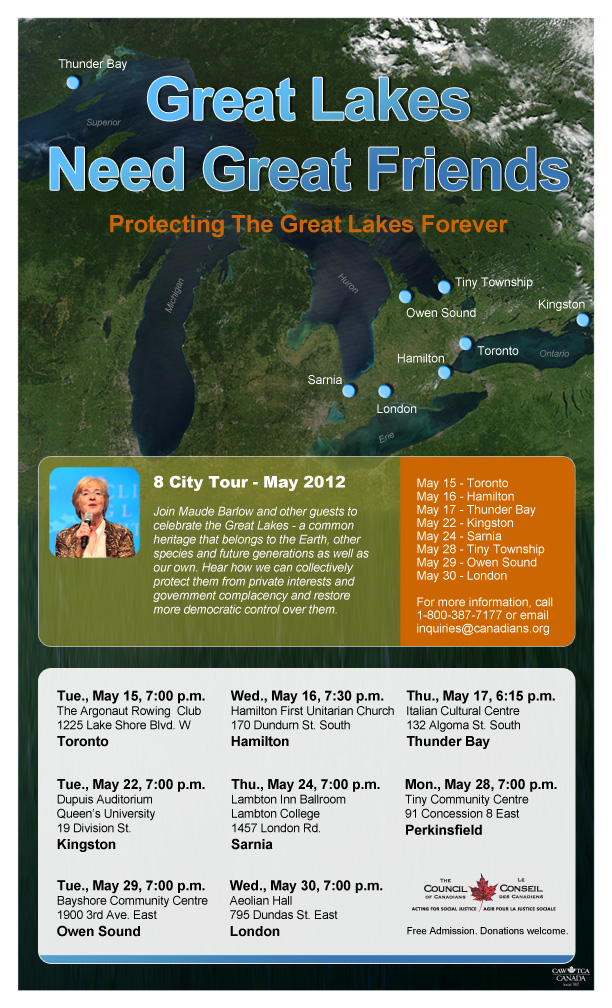On Tuesday May 15, the Council of Canadians will formally launch the Great Lakes Need Great Friends speaking tour in Toronto.
Maude Barlow, the National Chairperson for the Council of Canadians, will be joined by special guests in eight cities in the Great Lakes Basin to discuss pressing water issues threatening the lakes such as multi-point pollution, water withdrawals, industrial abuses, invasive species and nuclear waste storage and shipments.
Aside from the Toronto kick-off, the tour will visit Hamilton (May 16), Thunder Bay (May 17), Kingston (May 22), Sarnia (May 24), Township of Tiny (May 28), Owen Sound (May 29) and London (May 30).![]()
The Great Lakes provide life and livelihood to more than 40 million people and are the economic center at the heart of the continent. Yet despite critical cross-border agreements and the incredible work of many environmental organizations, the Great Lakes are still in serious trouble.
Maude Barlow points to the dueling visions of the lakes as a fundamental cause to the crisis facing the lakes. In her report Our Great Lakes Commons: A People’s Plan to Protect the Great Lakes Forever, she notes:
. . . we have built our economic and development policies based on a human-centric model and assumed that nature would never fail to provide, or that, where it does fail, technology will save the day. We have polluted, diverted and mismanaged the planet’s finite supplies of water to the point that they are now dangerously close to collapse in many parts of the world . . . The waters of the Great Lakes are no exception to this rule.
The tour will propose a new vision that encourages those living around the Great Lakes to collectively protect them based on some of the very principles and practices that informed the First Peoples of the region, namely that the Great Lakes must be shared equitably by all who live around them and protected for seven generations into the future.
The Council of Canadians, FLOW, On the Commons and other allies are calling for the Great Lakes to be declared a commons, public trust and protected bioregion. ‘Commons’ are areas that are shared, enjoyed and protected by all. Environmentally, this could refer to water, land or air.
Social programs, such as public health care and education, have also been thought of as commons. In technology, the Internet is an example. A commons cannot be commodified and bought and sold. People who enjoy a commons have both rights and responsibilities to preserve and protect the shared resource.
Under the Public Trust Doctrine, governments, as trustees, must protect these lakes for the common good from generation to generation.
A Great Lakes protected bioregion would require legislation that recognizes the inherent rights of the ecosystem and aquatic life of the Great Lakes Basin. Law and practice would protect all the waters of the Great Lakes Basin, and the restoration of its ground and surface waters would be a priority.
The tour will:
• Foster connections along the Great Lakes by making the links between current fights against threats such as fracking, bottled water withdrawals, invasive species and nuclear waste storage and shipments.
• Cultivate a Great Lakes stewardship by encouraging people to recognize they not only have a right, but a responsibility to protect the Great Lakes’ waters.
• Invite community involvement and encourage inspiring actions that will help shift the current market economy framework governing the Great Lakes to a framework based on commons and public trust principles.
The Council of Canadians will equip audience members with tools, such as a sample resolution on how to become a ‘commons community,’ that empower them to become or continue to be active stewards of the Great Lakes to protect the lakes for all time. The tour is the beginning of a needed conversation among communities on how we begin to create political and economic systems based on social justice, environmental protection, sustainable jobs and local democracy.
For event details, locations, speakers and tools, visit the Council of Canadians’ Great Lakes webpage.



